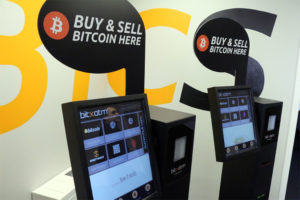Editor’s Note: Sponsored by Monday Properties and written by ARLnow.com, Startup Monday is a weekly column that profiles Arlington-based startups and their founders. The Ground Floor, Monday’s office space for young companies in Rosslyn, is now open. The Metro-accessible space features a 5,000-square-foot common area that includes a kitchen, lounge area, collaborative meeting spaces, and a stage for formal presentations.
 Bitcoin is hard to explain. It’s a “crypto-currency,” and it’s worth real money — just like Euros and pesos are worth real dollars — but it’s completely digital.
Bitcoin is hard to explain. It’s a “crypto-currency,” and it’s worth real money — just like Euros and pesos are worth real dollars — but it’s completely digital.
Blockchain Technology Consumer Solutions — or BTCS for short — was launched in 2013 as Bitcoin Shop, an ecommerce platform that allows users to buy goods with bitcoins and other digital currencies, like Dogecoin or Litecoin. Bitcoin Shop founders Michal Handerhan and Tim Sidie, now COO and lead developer respectively, had bought bitcoins but didn’t know how to spend them. So they created a way.
“They got some immediate traction from consumers and offers to help fund the company,” Chief Marketing Officer Charlie Kiser told ARLnow.com from BTCS’ Rosslyn office this month.
Kiser, who has worked in startups for years in the D.C. area, joined the team along with now-CEO and Chairman Charles Allen. In February 2014, Bitcoin Shop went public, raising $1.875 million in its initial public offering.
“Going public is not the most traditional route for startups,” Kiser admitted, “but it’s great in terms of speed and confidence in getting something closed. The idea was we could be one of the first publicly traded companies and we could accomplish some things in an industry with a lot of unknowns.”
In fact, most of the crypto-currency industry is unknown. While the currency exists, it’s not run by a bank or a government. It’s decentralized and far more unstable than currencies of developed countries. One bitcoin was worth more than $1,000 U.S. dollars near the end of 2013. Earlier this month, it was down below $200, and currently it’s hovering around $240.
 There is no mint for bitcoins, either. Instead of a government printing them, they are “mined.” BTCS has a partnership with a bitcoin mining company in Israel. How are they mined? Anyone who wants a bitcoin must provide technological maintenance to the bitcoin system. The more bitcoins are circulating in the world, the more work a “miner” must do to get a bitcoin.
There is no mint for bitcoins, either. Instead of a government printing them, they are “mined.” BTCS has a partnership with a bitcoin mining company in Israel. How are they mined? Anyone who wants a bitcoin must provide technological maintenance to the bitcoin system. The more bitcoins are circulating in the world, the more work a “miner” must do to get a bitcoin.
Bitcoins are exchanged and circulated on the “blockchain,” a “de-centralized peer-to-peer network” that works “effectively as a ledger system, reporting transaction,” Kiser says. Bitcoin was simply the first use of the block chain — many more are anticipated down the road.
That’s what intrigued Allen, a former engineer who was working at an investment bank before joining the company.
“I said ‘this company’s going to be much bigger than e-commerce,'” Allen said. “Bitcoin is basically the Internet in 1995. Back then, no one thought it had any use, but the technology made sense. At the heart of bitcoin, the technology makes sense.”
 BTCS has invested in a company that produces bitcoin ATMs and is currently developing a bitcoin wallet, similar to Google Wallet, that will help its users keep their currency secure. BTCS hopes to be an access point for anyone to enter the crypto-currency space, in any form they choose.
BTCS has invested in a company that produces bitcoin ATMs and is currently developing a bitcoin wallet, similar to Google Wallet, that will help its users keep their currency secure. BTCS hopes to be an access point for anyone to enter the crypto-currency space, in any form they choose.
“We’re hoping we can be a market leader into giving access to the digital ecosystem,” Kiser said. “We’re hoping BTCS is where you come for all that.”
Unlike other startups in emerging industries, BTCS has public investors to answer to. Investors can look to the four investments and one partnership BTCS has made as signs of progress toward market leader status. However, it’s simply too early to tell if these early gambles will pay off.
“We are long on bitcoin and blockchain,” Kiser said, “and we are getting ready to enter the valley of innovation. Whether it’s the currency or the blockchain, there’s been enough invested to know in five years whether there will be a consumer case for it.”
Through its investments and products, BTCS hopes to be the ones to usher the new technology into that era, but it’s waiting on the industry to help.
“There are all these problems that the technology solves,” Allen said. “They just haven’t been built yet.”


